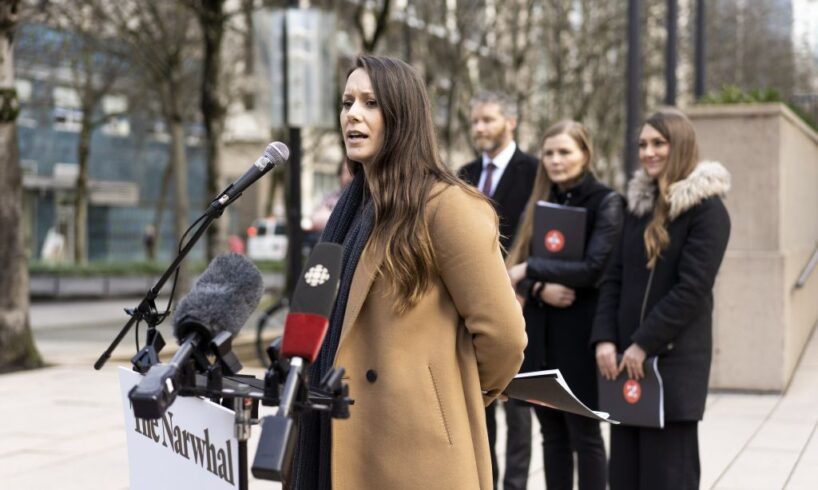
The saying of being “beside oneself” is used so often in expressions of gratitude that it can feel a little contrived.
But throughout the past week, as I watched more than 1,600 people come forward to donate $147,000 to our press freedom fundraiser, there were times when I physically felt outside of my own body. My mind whizzed back and forth between the present, the moment photojournalist Amber Bracken was arrested and the early days when The Narwhal was still an unproven concept in a dream I shared with Emma Gilchrist.
We started The Narwhal with an unwavering conviction that if we poured our heart and soul into public-interest journalism, the public would eventually see its worth and help pitch in to make it happen. Seven years in, our readers have proven that out time and time again. We now have more than 7,100 members who give what they can each month or year to keep this publication alive.
But last week I felt like we received a double dose of this magic, in ways that are hard to fathom.
Let me backtrack for a second. When we decided to pursue a case against the RCMP for Amber’s arrest, it wasn’t simply a moral calculation. As a small non-profit, we have to constantly fundraise to keep the wheels on the bus. The decision to pursue justice, for an indeterminate time and at an unknown cost, was one we feared could put The Narwhal at risk.
And yet the more we processed the experience of Amber’s arrest amongst ourselves and with the counsel of lawyers, the clearer it became that we needed to stand up for our rights and hold the police to account for throwing journalists in jail cells.
I knew it was going to be a mountain of work to bring this case. Still, I had no idea how the documents and briefings and amendments and transcripts would pile up as lawyers on both sides began in earnest to build their cases.
After a long day of legal proceedings in Vancouver, Carol Linnitt (centre) snapped a selfie with Amber Bracken (left) and the legal team, left to right: Evan Cribb, Sean Hern, Merran Hergert and Mila Ghorayeb.
In December, right before I came back to The Narwhal after a year of maternity leave, I had a call with a few team members and our lawyer to discuss how the hard costs of the upcoming trial were running up. Feeling out of the rhythm of a regular work week and daunted by the challenge of taking over lead of The Narwhal while Emma began her maternity leave (like ships in the night, the two of us!), those figures swirled in my head. Somehow, I needed to get back to my desk and fundraise for all of our operations and also a $20,000 bill for a court transcriptionist, and thousands for expert reports, and other spiraling case-related costs.
The timing felt tricky, too. I’ve expressed one hundred reasons why right now is a very difficult time for us to fundraise for the case: it feels like 10 years have passed since Amber’s arrest. Would anyone even remember this had happened? Will our January trial seem too far off to feel important to people? So much of the work of the case is confidential — how could we possibly stoke the passion of the public to care about documents and depositions they cannot see?
Despite these misgivings, putting off an ask also felt like a risk. We couldn’t just leave the burden of fundraising to the moment we were in trial. We simply had to bring our need to the public. We needed to bring it to you.
So, imagine our surprise and delight last week, when a mere 15 hours after sending out a single email we had already surpassed our $60,000 fundraising goal. The momentum pushed a gust of warm wind into our sails. Inspired, we made the audacious decision to double our goal, which we surpassed three days later. One week since that initial email was sent, we have $147,595.11 freshly set aside in our press freedom war chest.
I am reminded again of that little something that stirred in my chest when Emma and I spoke wistfully all those years ago of what we could do as journalists, if we could find a way to partner with the public.
We hear so often about how people are disconnected and disengaged, apathetic and suspicious of the media. But we wanted to believe in the real people obscured by those aspersions and stereotypes — people who just needed to be brought back into a meaningful relationship with journalists who actually serve them, serve the public interest.
Well, dear people, here we are. And look at what we’ve done.
We have a long struggle ahead of us, one likely to continue well beyond the five-week trial we have barreling down on us in January. But boy, am I ever glad to be walking that path alongside all of you. What a tremendous honour and privilege.
With all the gratitude a girl’s heart can muster, thank you.





